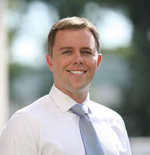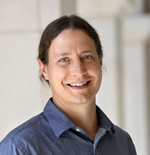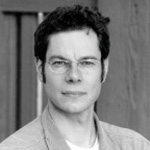When Washington University in St. Louis created the International Center for Advanced Renewable Energy and Sustainability (I-CARES) in 2007, it set aside $12.5 million for the endowment and start-up costs of five new professorships in the fields of energy, environment and sustainability.
Donors have since stepped forward to endow two more I-CARES professorships.
Ralph S. Quatrano, PhD, dean of the School of Engineering & Applied Science, announced Sept. 19, 2011, that the school would use the I-CARES endowment funds to support junior faculty through career development awards until future I-CARES professors are recruited.
Two engineering faculty have been chosen for career development awards: John Fortner, PhD, and Brent Williams, PhD, both assistant professors in the Department of Energy, Environmental & Chemical Engineering.
“Career development awards are wonderful vehicles to welcome young investigators to the distinguished group of I-CARES professors,” says Himadri Pakrasi, PhD, the George William and Irene Koechig Freiberg Professor of Biology in Arts & Sciences, professor of energy in the School of Engineering & Applied Science, and director of I-CARES. “I look forward to working with John Fortner and Brent Williams during the coming era.”
“As we compete with the very best engineering schools, it is often difficult to attract and retain highly sought-after emerging leaders, such as John Fortner and Brent Williams,” Quatrano says. “These I-CARES career development awards give our school a competitive edge as we build a strong international reputation in the areas of the environment, renewable energy and sustainable technologies.”
John Fortner

Fortner
Fortner was named the I-CARES Career Development Assistant Professor.
His research focuses on the environmental implications and applications of advanced materials.
He has studied the environmental fate, reactivity and impacts of engineered carbon nanomaterials, including fullerenes and carbon nanotubes, in aqueous systems.
Fortner also is developing nanoscale iron-based materials for detecting low levels of heavy metals and similar, metal oxide materials for novel, high-efficient, water treatment processes.
Fortner joined the WUSTL faculty in fall 2010. He earned a doctorate in environmental engineering from Rice University in 2006 and held postdoctoral positions at Georgia Institute of Technology and ETH Zurich in Switzerland. Before coming to WUSTL, he was an Intelligence Community Postdoctoral Research Fellow at Rice University.
Brent Williams

Williams
Williams was named the Raymond R. Tucker Distinguished I-CARES Career Development Assistant Professor.
His research focuses on the composition, chemistry and physical properties of Earth’s atmosphere, particularly the role of biogenic and anthropogenic gases and particles in Earth’s climate system.
Williams joined the WUSTL faculty as an assistant professor in fall 2010. He earned a doctorate from the University of California, Berkeley, where he developed novel organic aerosol measurement instrumentation — which he deployed to study urban and agricultural pollution and the long-range transport of pollutants.
After earning a doctorate, he served as a postdoctoral associate at the University of Minnesota Particle Technology Laboratory and as a postdoctoral scientist at Aerodyne Research.
Williams’ professorship is named in honor of Tucker, who earned a bachelor of science degree in mechanical engineering from WUSTL in 1920.
Tucker, who died in 1965, was an associate professor of mechanical engineering from 1927-1934, head of the Department of Mechanical Engineering from 1942-1953 and a three-term mayor of the City of St. Louis.
In the early 1930s, when he was an associate professor of mechanical engineering at WUSTL, he was active in promoting the adoption of an anti-smoke ordinance for St. Louis, and when this ordinance passed in 1937, he became the city’s first smoke commissioner.
Smoke pollution had been a problem in St. Louis for many years because of the large-scale burning of bituminous coal to provide heat for homes and power for businesses.
First I-CARES professor

Christof Jantzen of the Sam Fox School of Design & Visual Arts was the recipient of the first I-CARES professorship in 2009.
Jantzen is a LEED-accredited architect and founding partner of Behnisch Architects in Los Angeles. Headquartered in Stuttgart, Germany, Behnisch Architects also has offices in Munich and Boston. The firm has designed some of the world’s most distinctive, ecologically sensitive buildings, including the Institute of Forestry and Nature Research in the Netherlands; Norddeutsche Landesbank in Hanover, Germany; and the Genzyme Center in Cambridge, Mass.
Jantzen, a native of Aachen, Germany, earned a bachelor’s degree at the University of Kaiserslautern in Germany and a diploma at the Technical University of Darmstadt in 1985. In 1992, he earned a master of architecture at the Southern California Institute of Architecture (SCI-Arc) in Santa Monica.
He has taught design at the University of Stuttgart, SCI-Arc, California State Polytechnic University in Pomona, and the University of Southern California as well as at WUSTL.
As an architect, he continues to explore architectural theory while maintaining a practice that is grounded in the realization of built projects that synergize design excellence with sustainability.